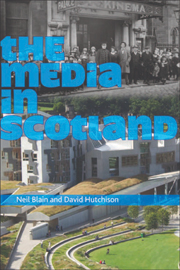Book contents
- Frontmatter
- Contents
- Preface
- Framing the Discussion
- The Historical Context
- Screen and Sound
- Themes and Futures
- 12 Gender, Spaces, Changes: Emergent Identities in a Scotland in Transition
- 13 Race and Ethnicity in the Media
- 14 Gaelic, the Media and Scotland
- 15 The Scottish Media and Politics
- 16 A View from Westminster
- 17 A View from Holyrood
- 18 Media Sport
- Select Bibliography
- Notes on Contributors
- Index
15 - The Scottish Media and Politics
from Themes and Futures
Published online by Cambridge University Press: 05 August 2013
- Frontmatter
- Contents
- Preface
- Framing the Discussion
- The Historical Context
- Screen and Sound
- Themes and Futures
- 12 Gender, Spaces, Changes: Emergent Identities in a Scotland in Transition
- 13 Race and Ethnicity in the Media
- 14 Gaelic, the Media and Scotland
- 15 The Scottish Media and Politics
- 16 A View from Westminster
- 17 A View from Holyrood
- 18 Media Sport
- Select Bibliography
- Notes on Contributors
- Index
Summary
Around the time this chapter was being written, the 300th anniversary of the union between Scotland and England had just been marked, and the third election for the Scottish parliament held. The result of that poll saw the Scottish National Party emerge with the greatest number of votes, and one parliamentary member more than Labour, which thereby lost its political dominance in Scotland for the first time in a generation. This chapter will explore the performance of the Scottish media in post-devolution political life, before turning its attention to the specific coverage of the 2007 election.
INTRODUCTION: THE SCOTTISH PUBLIC SPHERE
The distinctive nature of the Scottish public sphere since the formation of the United Kingdom in 1707, and of Scottish political culture in recent times, has been widely acknowledged (Schlesinger 1998). Scotland, as a recognised nation within a multi-nation state, has always had separate legal and educational systems from those of its larger neighbour south of the border (and also from Northern Ireland and Wales, the other countries of the union). As far as the media are concerned, the different approaches to, for example, contempt of court and defamation north of the border affect their daily operating practices. Scotland also has its own religious institutions and a separate system of local government from that of England. Scotland, in short, has never been merely a region of England, but has always been recognised as a national entity with autonomy in key areas of its political, economic and cultural life. The Union was not a colonial imposition, but an agreement voluntarily entered into, on the basis that the respective national identities of its constituent elements would be preserved.
- Type
- Chapter
- Information
- The Media in Scotland , pp. 227 - 242Publisher: Edinburgh University PressPrint publication year: 2008

